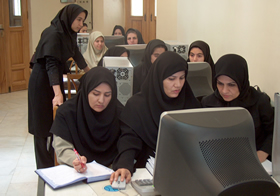World Health Organization: Good Practice Example
Tackling Poverty and Social Determinants of Health through Community-based Initiatives (CBI) in the Countries of the Eastern Mediterranean Region
Programme Background
Many of the inequalities in health, both within and between countries, can be understood in terms of social inequalities in which people live and work. The social conditions of daily life have a major impact on health status and on general wellbeing. Tackling such underlying causes of poor health can contribute to improving health and health equity (defined as remediable difference in health status). The goal of CBI is to create development policies and directions that are supportive to health, community empowerment and local governance to ensure health equity and quality of life.
Programme Process
The most salient aspects of this approach are the organization, mobilization and enhancement of community capabilities, particularly women's empowerment and involvement in social and income-generating schemes emphasizing basic needs. These constitute the most powerful determinants of good health, quality of life and productivity. CBI methodology is based on the concept that poverty reduction for health and health for poverty reduction are two sides of the same coin. Community based initiative approach is able to mobilize the scarce commodity of intersectoral collaboration and adequate in ensuring the satisfaction of the people's basic needs.
Programme Impacts
 |
| Women in Iran learn computer skills through the Isfahan Healthy City Project. (Photo: WHO) |
The programme has been evaluated in Djibouti, Islamic Republic of Iran, Jordan, Pakistan, Syria, Sudan and Yemen, where there has been a demonstrated effectiveness of literacy and vocational training centres for women in contributing to an increase in the percentage of pregnant women with access to regular antenatal and postnatal care; the percentage of deliveries assisted by a trained birth attendant; the percentage of children who undergo regular growth-monitoring visits; vaccination coverage; access of households to safe drinking-water and sanitation and healthy lifestyle practices.
These results have been achieved through training of women volunteers who have contributed in improving health indicators in their local areas. The evaluations have also identified that women's involvement in local socioeconomic development including local health planning has increased in the CBI sites. The evaluations have indicated increased participation of women in income-generating activities; empowered communities that feel confident in approaching local governments and other agencies for new projects; and better health coverage indicators. Our experience has shown that ownership and involvement of the community in the local development process bring significant positive change in local socioeconomic indicators, including income, literacy and security. Women in particular, if empowered and supported to be proactive in societal actions, bring about real change in development of their societies.
For further information, visit www.emro.who.int/cbi